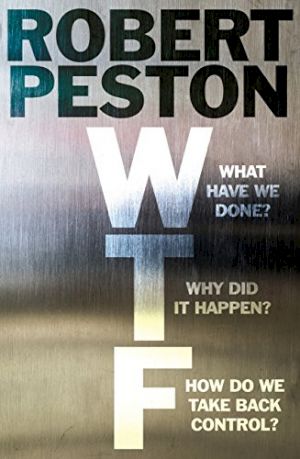11 April 2018
WTF
What have we done? Why did it happen? How do we take back control?
Robert Peston
2017, Holder and Stoughton, 264 pages,
Reviewer: Rosemary Connell

WTF scopes a thoughtful and personalised view of what has gone badly wrong recently. The pros and cons of Brexit are debated in detail as are the reasons why the UK voted for Brexit.
The author argues that Cameron/Osbourne/Clegg went for austerity which reduced Britain’s growth prospects resulting in less tax revenues to fund schools, hospitals etc thus disproportionately harming the poor, while the Bank of England cut interest rates and went for quantitative easing to stimulate the economy. This resulted in the inflation of prices of assets, enriching the owners of houses, bonds and other assets and widening the wealth gap between rich and poor.
Among Prime Minister May’s mistakes were the triggering of article 50 which imposed a hard deadline, March 2019, thereby giving away significant leeway in negotiating power. This was followed by the disastrous decision to hold a snap election.
Votes for Trump, Brexit and Corbyn, it is argued were votes against the establishment and the unfairness of society combined with economic prospects.
Changes in population structure, effects of globalisation and trade union membership are all discussed and it is suggested that lessons should be learnt from Swedish successes.
The role of social media, clever information-gathering techniques, and data-mining of internet details may all lead to future elections being fought in quite different ways.
The productivity puzzle is analysed and the UK’s relatively lower productivity is linked to infrastructure, bank judgements, and low interest rates keeping Zombie companies alive. The role of the crash, pro and cons of immigration, Brown’s policies and the disasters of PFI are all called to account.
Technology, the role of robots and which types of jobs are most likely to be lost are debated and it is argued that, with robots taking over jobs, the rewards for capital would be larger leading to a worsening of inequality.
The author offers a series of suggestions to set up debates as to how to try to fix the mess in which we find ourselves in these uncertain times. He advocates education to promote creativity, flexibility and empathy rather than the focus on grades and exams; a reduction of the power of the Treasury and an empowered Cabinet office; elimination of tax differences for different forms of employment; learning the lessons of the Grenfell disaster; and a wealth of other possibilities and actions to improve the situation.
Robert Peston provides a superb and well-written analysis of what has gone wrong in the recent past and offers suggestions as to how to start to mend our fractured society.
